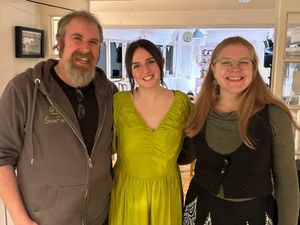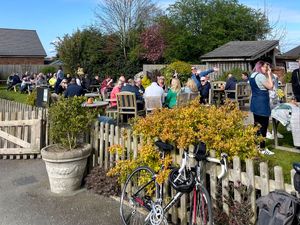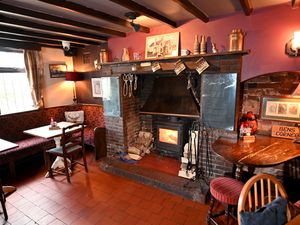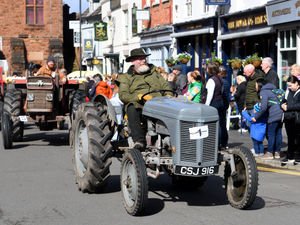Battle of Britain anniversary interactive special: Remembering the heroics of The Few
Amid four months of aerial battles there was one day above all that showed Nazi Germany that Britain would not surrender.
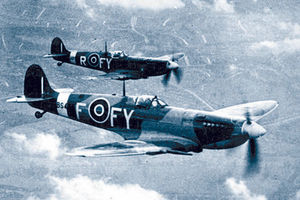
Seventy-five years ago today the Luftwaffe launched two huge attacks as bombs rained down on London with Hitler sniffing victory.
But the plucky airman of the RAF achieved the seemingly impossible and defeated the German advance that outnumbered the British two to one.
Now known as Battle of Britain Day, September 15 will be remembered as the day Britain refused to succumb to evil.
Believing that the RAF was close to breaking point, the German attacks were a repeat of their monumental and devastating attack eight days before.
Smaller formations of German planes were also planned to attack Portland and Southampton.
Prime Minister Winston Churchill visited RAF Uxbridge, the headquarters of No. 11 Group, Fighter Command.
This group was led by Air Vice-Marshal Keith Park and was responsible for the defence of London and the south-east of England.
The first wave of about 250 bombers came over the Channel at 11am and whilst many Luftwaffe planes were intercepted by the RAF, around half managed to make it to London and drop their loads.
A second wave of about the same number returned at 2pm believed to be aiming for south London and the railways out to Kent. The raids continued into the night.
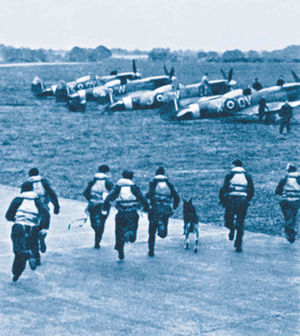
Churchill later described what he saw at 11 Group: "Presently the red bulbs showed that the majority of our squadrons were engaged.
"In a little while, all our squadrons were fighting and some had already begun to return for fuel. All were in the air. The lower line of bulbs was out. There was not one squadron left in reserve".
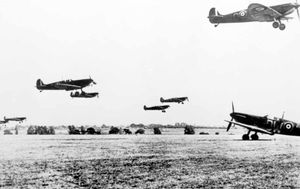
During both of the raids that day, the RAF managed to scatter many of the German bomber formations.
This meant that when the surviving bombers did drop their loads, they fell over a wide area and were less harmful.
Thousands of Londoners stood in the streets below watching the battle rage over their heads.
The Few remembered on Twitter:
The RAF's 630 fighter aircraft had to battle with 620 German fighters and 500 bombers.
Figures are disputed but the Nazi's lost around 56 aircraft to Britain's 26.
The Allied airman are became known as The Few and their contribution to defeating the Nazis and their role in changing the course of history cannot be underestimated.
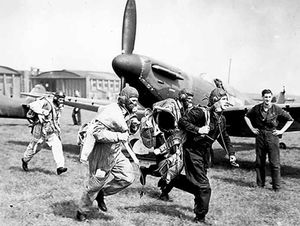
The bombings began on July 10, 1940, and by August the outlook seemed desperate for Britain.
With airfields bombed and fighter aircraft either wrecked on the ground or shot down, the RAF was running short not only of planes but of pilots.
Although fighting continued in the air for several more weeks, and British cities were bombed sporadically for the rest of the war, German tactics to achieve air superiority ahead of an invasion failed.
Many of Britain's cities were devastated by the bombing. Birmingham Liverpool, Glasgow, and Plymouth were some of the most heavily bombed during The Blitz, with Coventry decimated.
But Shropshire did not escape - with two people killed in Luftwaffe raid which started at 1.30am on August 29, 1940.
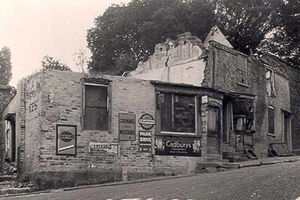
A total of 12 bombs were dropped on a town that Hitler had apparently earmarked as being his base following the Nazi invasion. Pound Street, Church Street and St Mary's Street were all hit during the raid, which took Bridgnorth public by surprise.
Historian Clive Gwilt said the German raiders were probably following the river to find their way and unloaded a string of bombs on the town en route. He said: "The largest was an oil bomb, which was dropped on Pound Street near the Squirrel Hotel and others were dropped around the town without fatalities.
Although there was much damage and loss of life to come, Sunday September 15, 1940, marked a clear and decisive defeat for the Luftwaffe.
They abandoned the daylight bombing of London on September 30, although night-time bombing continued into May 1941.
But it was the heroics of The Few this day 75 years ago that showed Hitler and the Nazis that the war was far from over.
As Mr Churchill said: "This was their finest hour."

